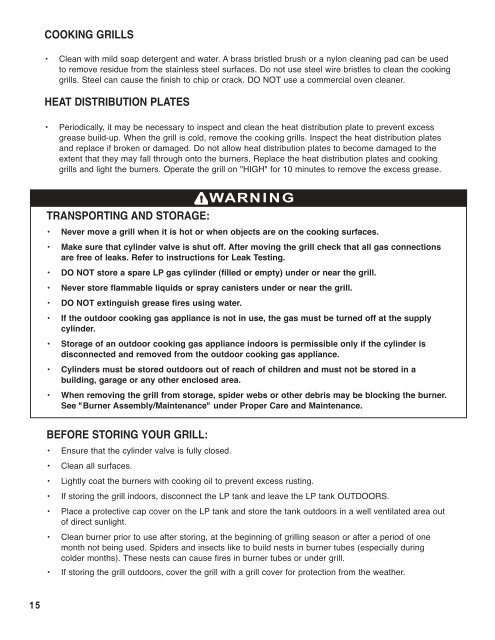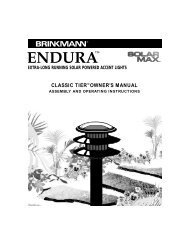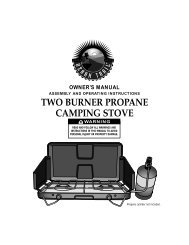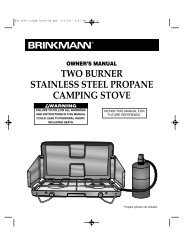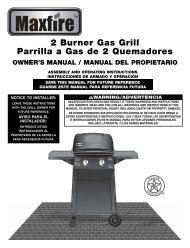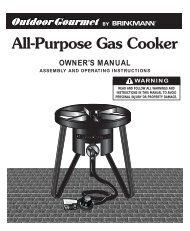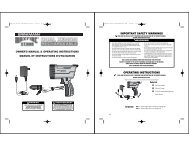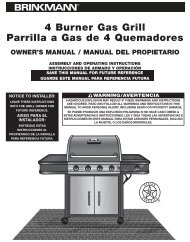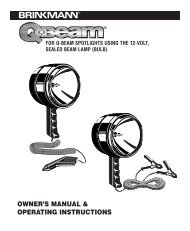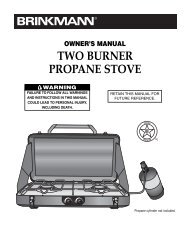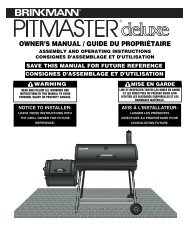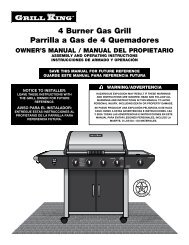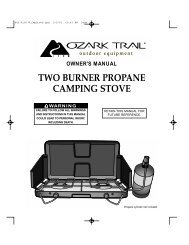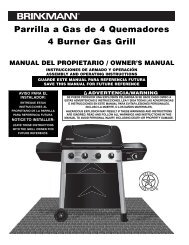Tailgate Gas Grill Barbecue au gaz pour festin - Brinkmann
Tailgate Gas Grill Barbecue au gaz pour festin - Brinkmann
Tailgate Gas Grill Barbecue au gaz pour festin - Brinkmann
You also want an ePaper? Increase the reach of your titles
YUMPU automatically turns print PDFs into web optimized ePapers that Google loves.
COOKING GRILLS<br />
• Clean with mild soap detergent and water. A brass bristled brush or a nylon cleaning pad can be used<br />
to remove residue from the stainless steel surfaces. Do not use steel wire bristles to clean the cooking<br />
grills. Steel can c<strong>au</strong>se the finish to chip or crack. DO NOT use a commercial oven cleaner.<br />
HEAT DISTRIBUTION PLATES<br />
• Periodically, it may be necessary to inspect and clean the heat distribution plate to prevent excess<br />
grease build-up. When the grill is cold, remove the cooking grills. Inspect the heat distribution plates<br />
and replace if broken or damaged. Do not allow heat distribution plates to become damaged to the<br />
extent that they may fall through onto the burners. Replace the heat distribution plates and cooking<br />
grills and light the burners. Operate the grill on "HIGH" for 10 minutes to remove the excess grease.<br />
TRANSPORTING AND STORAGE:<br />
WARNING<br />
• Never move a grill when it is hot or when objects are on the cooking surfaces.<br />
• Make sure that cylinder valve is shut off. After moving the grill check that all gas connections<br />
are free of leaks. Refer to instructions for Leak Testing.<br />
• DO NOT store a spare LP gas cylinder (filled or empty) under or near the grill.<br />
• Never store flammable liquids or spray canisters under or near the grill.<br />
• DO NOT extinguish grease fires using water.<br />
• If the outdoor cooking gas appliance is not in use, the gas must be turned off at the supply<br />
cylinder.<br />
• Storage of an outdoor cooking gas appliance indoors is permissible only if the cylinder is<br />
disconnected and removed from the outdoor cooking gas appliance.<br />
• Cylinders must be stored outdoors out of reach of children and must not be stored in a<br />
building, garage or any other enclosed area.<br />
• When removing the grill from storage, spider webs or other debris may be blocking the burner.<br />
See "Burner Assembly/Maintenance" under Proper Care and Maintenance.<br />
BEFORE STORING YOUR GRILL:<br />
• Ensure that the cylinder valve is fully closed.<br />
• Clean all surfaces.<br />
• Lightly coat the burners with cooking oil to prevent excess rusting.<br />
• If storing the grill indoors, disconnect the LP tank and leave the LP tank OUTDOORS.<br />
• Place a protective cap cover on the LP tank and store the tank outdoors in a well ventilated area out<br />
of direct sunlight.<br />
• Clean burner prior to use after storing, at the beginning of grilling season or after a period of one<br />
month not being used. Spiders and insects like to build nests in burner tubes (especially during<br />
colder months). These nests can c<strong>au</strong>se fires in burner tubes or under grill.<br />
• If storing the grill outdoors, cover the grill with a grill cover for protection from the weather.<br />
15


